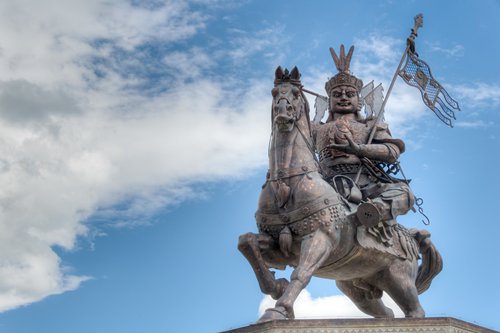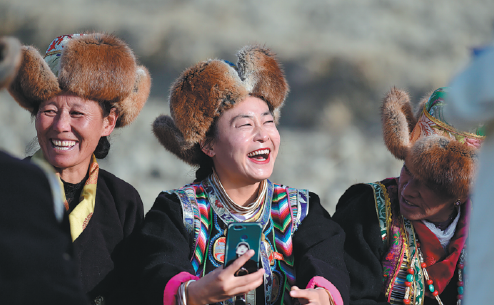
From the People's Daily app.
And this is Story in the Story.
2019 marks the 60th anniversary since the launch of democratic reform in Tibet.
In traditional Chinese culture, the 60th year is memorable as it completes a cycle called the "jiazi", a concept unique to the Chinese calendar.
And villagers living in the Qinghai-Tibet Plateau have preserved their ancient oral story-telling traditions.
The story of King Gesar has been passed on from one generation to the next by local singers and oral storytellers.
The oral tradition is inscribed on the UNESCO list of world intangible cultural heritage and believed to be the world's longest epic.
Today's Story in the Story looks at the villagers of Qinghai Province and how they have preserved the long-lasting tradition of epic storytelling.

A statue of King Gesar in the Yushu Tibetan Autonomous Prefecture, Qinghai Province. (Photo: IC)
The story of King Gesar, an 11th-century Tibetan warrior with vast supernatural powers, has for centuries been preserved by the singers and storytellers living on the Qinghai-Tibet Plateau.
In 2014, Durbud village was recognized as a national-level King Gesar cultural protection zone.
Every night, Palmo, a 25-year-old herdswoman from Durbud village in the Golog Tibetan Autonomous Prefecture, sings episodes from the epic of King Gesar to put her 8-month-old daughter to sleep.
"Sometimes my baby daughter makes funny noises when I sing as if she understands what I am singing," Palmo said, adding that many children in her village learned the epic as bedtime stories.
The village, at an average altitude of over 4,000 meters, is home to some 860 herders, most of whom can sing at least a few lines from the epic.
According to local legends, the village was the battlefield where King Gesar and his invincible army vanquished the enemies and brought help to local people.
"Every family in the village would sing the epic to commemorate King Gesar's birthday each year, which falls on the 15th day of the 12th month of the Tibetan calendar," Palmo said.
She added that a wide variety of festive activities and religious rituals related to King Gesar are held in the village throughout the year, such as epic singing contests and horse racing.
"During every winter vacation, some 30 children in the village gather together to learn how to sing the epic," said 55-year-old Druju, Palmo's father and a veteran epic singer.

Villagers celebrate the start of ploughing in Menzhonggang village, Lhokha city, Tibet autonomous region, on March 16. (Photo: Xinhua)
In 2014, Durbud village was recognized as a national-level King Gesar cultural protection zone, thanks to its well-preserved oral tradition of the epic.
A King Gesar museum, which displays the epic's history and introduces the epic singers, was also set up in the village. On the first floor, villagers chant the fascinating stories of the mythical demigod king.
"Our village has built a King Gesar theme park, which attracted some 20,000 visitors last summer," said Tselob, a local official, and added, “Visitors can watch the villagers sing the epic while appreciating the natural sceneries on the plateau."
"The epic of King Gesar is a collective memory and unique culture created by Tibetan people," said Jampel Gyatso, a researcher with the Institute of Ethnic Literature, Chinese Academy of Social Sciences.
"The preservation of its oral tradition in Durbud village is the living embodiment of Tibetan people's wisdom," he added.
(Produced by Nancy Yan Xu, Lance Crayon, Brian Lowe and Chelle Wenqian Zeng. Music by: bensound.com. Text from China Daily and Global Times.)


